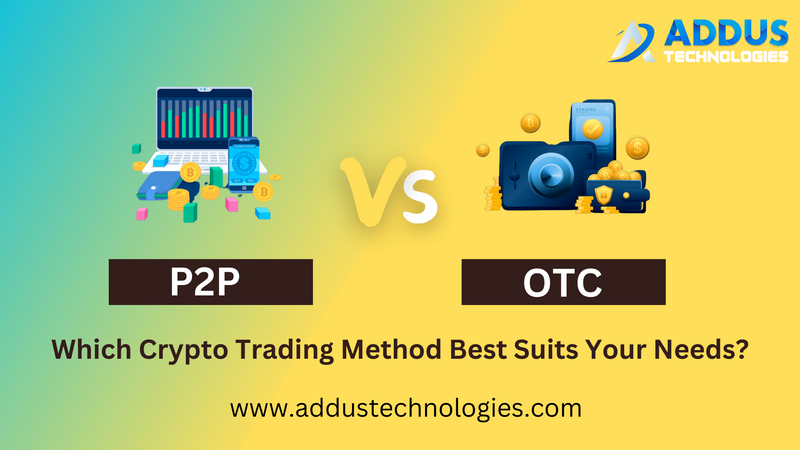Traders and investors are on a constant lookout for the most effective, safe, and profitable ways to trade digital assets. Peer-to-peer (P2P) trading and Over-the-Counter (OTC) trading stand out as two favored methods, each offering unique benefits customized to meet the various requirements, preferences, and objectives of different traders. Let's explore the details of P2P and OTC trading to identify which method suits your Cryptocurrency Exchange trading needs.
Understanding P2P Trading
P2P or Peer-to-peer trading, operates on a decentralized model where buyers and sellers conduct transactions directly without intermediaries. P2P trading platforms facilitate this by providing a space for users to post their buying or selling orders and find matching offers.
Advantages of P2P Trading:
Privacy and Anonymity: With direct transactions between two parties, P2P trading ensures a higher level of privacy.
Global Access: This method enables traders from various locations worldwide to engage directly.
Flexible Payment Methods: Users can choose from a variety of payment methods, offering convenience to those with limited access to conventional banking.
Disadvantages of P2P Trading:
Price Variations: Due to its decentralized nature, there can be significant price discrepancies from the general market rate.
Time-Consuming: The process of finding a matching order and negotiating terms can take time.
Understanding OTC Trading
OTC trading, meaning Over-the-Counter trading, is the process of trading cryptocurrencies directly between two parties, bypassing the public exchange. This method is often preferred for executing large transactions and is facilitated by OTC brokers who connect buyers with sellers.
Advantages of OTC Trading:
Large Transactions: Suited for large trades, OTC minimizes market impact and price slippage.
Price Stability: Direct negotiations lead to more stable pricing than fluctuating market rates.
Efficiency and Privacy: OTC trading is swift, allowing parties to remain anonymous, thus ensuring privacy and security.
The disadvantage of OTC Trading:
Entry Barrier: Generally, OTC trading caters to institutional or affluent individuals due to the significant trade volumes.
Broker Dependency: Traders depend on brokers to find trading partners, which might introduce fees and potential conflicts of interest.
Less Transparency: Trade prices and volumes are private, reducing transparency.
Which Method Suits Your Needs?
The choice between P2P and OTC trading depends on various factors
Trade Volume: For large-scale trades, OTC trading is preferable for its efficient and discreet handling of substantial transactions. Conversely, P2P platforms are more suited for smaller, informal trades due to their accessibility and versatility.
Privacy Concerns: P2P trading has an advantage in prioritizing privacy and anonymity. Yet, for large trades requiring confidentiality, OTC trading offers the necessary privacy.
Experience Level: P2P platforms may be more user-friendly for beginners, thanks to their intuitive interfaces and supportive communities. On the other hand, OTC trading is likely a better fit for seasoned traders or institutional investors familiar with large-scale transactions.
Risk Tolerance: Those cautious of scams and seeking a safer trading environment might find OTC trading more reassuring, given its regulated brokers. P2P trading demands greater diligence to avoid fraud.
P2P and OTC trading each provide unique benefits that cater to various trader profiles. Your decision should be informed by your trading volume, privacy needs, experience, and risk tolerance. By evaluating these aspects, you can choose the trading method that best matches your cryptocurrency trading requirements, ensuring a more efficient and profitable experience.
Conclusion
Introducing ADDUS Technologies, your gateway to seamless trading! Unlock the trading world with our advanced SPOT, P2P, and OTC exchange solutions are an Exclusive 50% Limited-Time Offer! Don't miss out – Empower Your Investments with ADDUS Technologies!



Top comments (0)